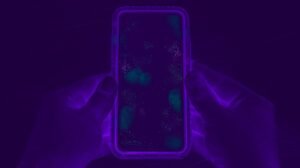
Did you know that your iPhone or Android phone is one of the dirtiest things you touch every day? You probably wash your hands after touching something dirty, but then pick up your dirty phone. It’s time to do something about it.
How dirty is your phone right? According to research from the University of Arizona, phones are ten times dirtier than most toilet seats. It’s pretty disgusting when you consider that you would never put your face on a toilet seat.
It makes sense when you stop and think about it. Your phone is exposed to all the same things you touch, but most people do not wash their phones when they wash their hands. Not to mention all the use of bathroom phones. It all builds up over time and gets dirtier.
Can I wash my phone?

Okay, so your phone’s dirty, what now? You may be wondering if you able to just wash it when washing hands. It depends on what phone you have.
Many modern smartphones are marketed as having “water resistance”. Note that they do not say “waterproof.” Nothing is really “waterproof”. There are different levels of how much water a unit can handle before it breaks.
If your smartphone can handle water, it probably has an IP rating like “IP68” or “IP67.” The second number is what determines the water resistance. Eight means “immersion beyond 1 meter, seven is” immersion up to 1 meter. ”
Check the manufacturer’s website to see if your phone has an IP rating. If it has a rating of IP67 or IP68, you can definitely run some soapy water over it for quick cleaning. It is not necessary to immerse it completely.
RELATED: How water resistance ratings work for gadgets
What about cleaning wipes?

Napkins and cleaning solutions containing alcohol are commonly used to clean surfaces. Of course, you can reach out for these to clean your phone. Are they safe to use? Can alcohol damage the device?
Apple and Samsung both recommend using a 70% isopropyl alcohol cleaning solution to clean their devices. The concern people have with alcohol-based cleaners is destroying the oleophobic coating on the screen.
Oleophobic coatings wear off with regular use, but forced cleaning of the screen with detergents containing alcohol can speed up this process. However, it is only if you use them forcibly. Wiping the screen off once a week or so will not make much of a difference.
In addition to the screen, the other parts of the phone should be in order. Again, you want to make sure that the device has some water resistance. Alcohol can interact with certain types of plastic in ways you may not like as much. It is always a good idea to do a little test before drying the entire device from top to bottom.
Clean with light

Another option does not require liquids or napkins at all. Certain wavelengths of ultraviolet light (the type of light from the sun) can kill and limit the growth of microorganisms. Are you just going to put your phone in the sun for a while? Not exactly.
There is a whole market of UV light disinfectants. These products often look like mini tanning booths. The idea is that you put your phone inside, turn on the UV light and let it bathe in the light for several minutes to kill all the bacteria.
The downside of these products is that they are on the expensive side. You can easily pay around $ 100 for a UV light cleaner that fits a smartphone. There are other options that are a little more affordable. Once your phone is in the dry cleaner, it can not be used, which can also be a bit annoying.
In the long run, UV light is probably not as harsh on your phone as water and cleaning products. It’s about what’s more convenient for you.

Think clean
Whichever cleaning method you choose, it is important that you actually choose one. Most people do not even think about cleaning their smartphones. Whether you have an iPhone or an Android device, it needs to be cleaned semi-regularly. Your hands pick up bacteria from things you touch, and you probably do not touch many things as often as your phone.
